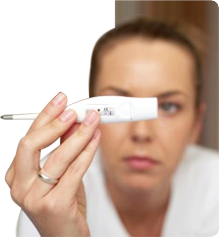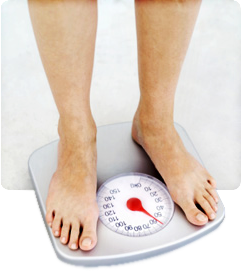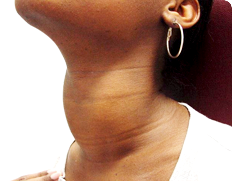Popular Articles
- Thyax Supplement Facts
- Best Supplements for Thyroid Deficiency
- Natural Alternatives to Synthroid
- Losing Weight Might Be Hard With Low Levels of This...
- Thyroid Health - Natural Ways to Boost an Underactive Thyroid
- Product Review | Armour Thyroid
- Low T3 and T4 Levels? Boost it: Heres How...
- Thyroid Health | The Best Vitamins for Hypothyroidism
- Ginger and Weight Loss
- Best Weight Loss Supplements for Men and Women
- More Articles ...
 Thyroxine DeficiencyIn This Article
Give yourself a head start on your thyroid health by knowing what signs to look for in a thyroxine deficiency.
Thyroxine is the hormone secreted by the thyroid gland. It is commonly known as T4, and your doctor can test the levels of thyroxine in your blood with a couple of simple blood tests. Thyroxine deficiencies can cause many problems, and the lack of the hormone thyroxine is known as hypothyroidism. That means the thyroid gland is not producing enough hormones. The alternative to hypothyroid is hyperthyroid, where the body is overproducing thyroxine. Both conditions cause mild to serious symptoms. 7 Everyday Signs of a Thyroxine DeficiencyThere are many symptoms of a lack of thyroxine in the system. Many of them can easily be mistaken for general everyday occurrences such as:
As you can see, the above side effects of a thyroxine deficiency are things anyone might experience occasionally. However, if you are experiencing any or all of the above symptoms regularly, checking for abnormal thyroid action is a good idea. 8. Difficulty Losing Weight
One warning in regards to blaming a thyroxine deficiency for the inability to lose weight is that most obesity problems are caused by a seriously bad diet and overeating. Too often people with weight problems blame the thyroid without cause. However, if you are watching what you eat, eating a well-balanced diet, and still not losing weight, talk to your doctor about having your T4 levels tested. Also, 7 less common problems that may point to a thyroxine deficiency are: 9. Brittle nails In general, thyroid disorders can leave you feeling like you have no energy at all. This lethargy affects all aspects of your life. In children and adolescents, a thyroxine deficiency can have long-lasting effects related to growth and psychological well-being. Sign 16: Goiter, the External Sign of Thyroxine Deficiency |
| Myths/Facts: Thyroxine Deficiency |
| Fact: People living in coastal regions inhale iodine from the saltwater air around them daily, and experience fewer thyroid problems than inland inhabitants |
| Myth: Treating hypothyroidism with synthetic thyroxine can increase the risk of osteoporosis. |
| Fact: Thyroxine deficiencies can create more severe cases of PMS in women. |
| Myth: Thyroxine deficiencies are contagious. Thyroid conditions are not contagious in any way. What You Need to Know About Thyroxine Tests |
General blood tests and physicals do not normally reveal even major thyroid dysfunction. If you suspect a thyroxine deficiency it is important to request TSH, T3, and T4 tests so that you can catch a thyroxine deficiency.
If no deficiency shows up on the tests, but you still are experiencing the symptoms listed above, consider adding natural thyroxine boosters to your diet.
Testing for Thyroxine Deficiencies at Home
While it is not meant to take the place of testing by your physician, there is a test you can do yourself to see if you have a thyroxine deficiency.
Because thyroxine deficiencies cause difficulty in regulating body temperature, you can use that to see if your body responds normally to changes in external temperatures.
 Take your temperature every morning as soon as you wake up before you even get out of bed.
Take your temperature every morning as soon as you wake up before you even get out of bed.
Make sure you prepare the thermometer correctly, depending on the type of thermometer you are using. For a common glass thermometer, make sure you shake it down all the way before taking your temperature.
You can take your temperature in any way you prefer (under the armpit, or the tongue) but the most accurate basal body temperature reading is from oral (or rectal) readings.
Repeat this process three days in a row. Add all three numbers together at the end of your test, and divide by three. If the average body temperature over a three-day period is less than 97.8F you have a hypothyroid problem.
Synthetic Thyroxine
If you test positive for hypothyroidism, your physician will likely put you on a schedule of synthetic thyroxine known as L-Thyroxine and sold under the names: Levothroid, Synthroid, Levoxyl, and others.
Natural Thyroxine Boosters
 If you feel you have a mild hypothyroid problem and want to attempt to regulate it at home, the safest manner is to make changes to improve your diet. Here are some foods for hypothyroidism: kale, kelp oysters, foods high in vitamin C, nuts, tuna, bell peppers, and salmon.
If you feel you have a mild hypothyroid problem and want to attempt to regulate it at home, the safest manner is to make changes to improve your diet. Here are some foods for hypothyroidism: kale, kelp oysters, foods high in vitamin C, nuts, tuna, bell peppers, and salmon.
Homeopathic Thyroxine Boosters
Iodine supplements and foods high in iodine such as the above-mentioned kelp help stimulate thyroxine production.
The government instigated an iodine improvement program decades ago that included iodizing common table salt to improve iodine levels in the diet, but since people are eating less salt, there has been an increase in thyroid problems.
For that reason, it is important to make sure you get enough iodine, either by natural foods or supplements to keep from developing thyroxine deficiencies.





 Headaches
Headaches Difficulty in losing weight is another symptom of thyroxine deficiency. Since thyroxine is an important metabolism stimulant, a lack of thyroxine in the system will cause a very slow,
Difficulty in losing weight is another symptom of thyroxine deficiency. Since thyroxine is an important metabolism stimulant, a lack of thyroxine in the system will cause a very slow, 